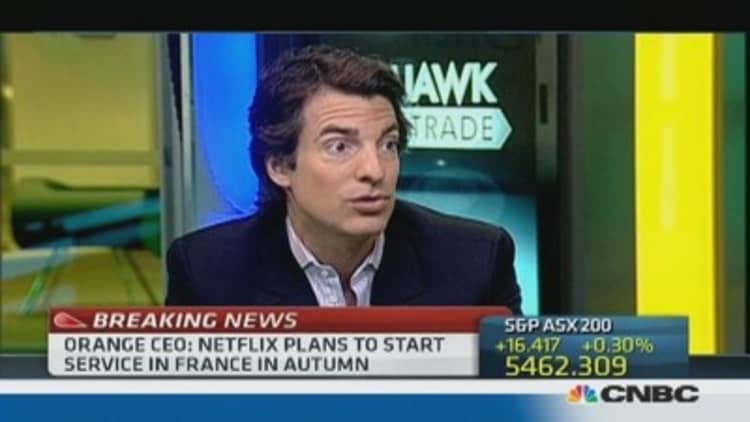
The technology sector is the center of a polarizing debate about whether stocks such as Twitter and Facebook are overvalued. And now Netflix has entered that camp with a stunning rally that have left some analysts unconvinced that its bull run is here to stay.
Netflix's stock has rallied 153 percent in the last 12 months and is trading at over $450 a share, valuing the company at $26.9 billion. Such a valuation is not warranted, according to Pedro De Noronha, managing partner at Noster Capital, because the company's business model is not sustainable.
"I think when you look at these overhyped stocks, and Netflix is just one of them, if you compare it to the dotcom boom where you had Amazon and so on, everybody knew Amazon was a good service, everybody saw Amazon turn into a gigantic company that pretty much serves every kind of thing you need. But it was the wrong price, just like it is the wrong price now for Netflix," Noronha said.
(Read more: Verizon CEO: We expect a deal with Netflix)
Analysts are mixed about their views towards Netflix, but not many more are bullish on the stock seeing further upside.
In January Netflix posted fourth-quarter earnings that smashed analysts' expectations with accelerating sales growth, ending the year on 44 million subscribers. With earnings momentum in Netflix's favor, some analysts don't think a high valuation necessarily means the stock will fall.
"The sector in general is very hot and in that environment things get puffed up. Just because it has a high valuation I don't necessarily think that means it's going to fall. I don't see any banana skins on the horizon," Alex De Groote, media analyst at Panmure Gordon, told CNBC in a phone interview.
Despite strong growth, analysts are worried about the low margins for Netflix's streaming business. In the U.S. Netflix offers a traditional DVD delivery service to customers which can be ordered online. This part of their offering has a 52 percent profit margin, while the streaming arm has 11 percent. Noronha said the company's revenue model, in which users pay a monthly subscription, is enough to see the company grow.
(Read more: How net neutrality debate could affect consumers)
"Netflix has an existential problem, which is that what they pay for their content is more than what they are taking in from their subscribers. So they have to increase prices to their subscribers to make that profit machine start working," he told CNBC.
"The problem they have is last time they tried to hike prices, the stock tumbled by close to two thirds. So when is the market going to start finally realising, it's a great service…but that doesn't mean that you need to own the stock."
A European representative of Netflix declined to comment.
European expansion
Netflix has been trying to broaden the appeal of their product to appeal to investors and grow their subscriber base with original programming such as "House of Cards", which has been extremely popular, as well as a deal with Comcast to improve streaming quality.
(Read more: 'House of Cards' 101: How to manage the media)
On Friday, Stephane Richard, the CEO of French telecom company Orange, said Netflix has contacted operators there ahead of its autumn launch. The streaming giant is also eyeing expansion into Belgium and Germany.
Richard Broughton, head of broadband at IHS, said after consolidating its user base last year, Netflix is now looking for expansion to grow its subscriber base.
"It was more about consolidation of a subscriber base last year. France and Germany are being talked about as is Belgium so that is significant expansion. They are good markets, have a good broadband structure and customers with a willingness to pay. It's big deal from their standpoint but those markets are not cheap to compete in," Broughton said in a phone interview.
—By CNBC's Arjun Kharpal: Follow him on Twitter @ArjunKharpal


